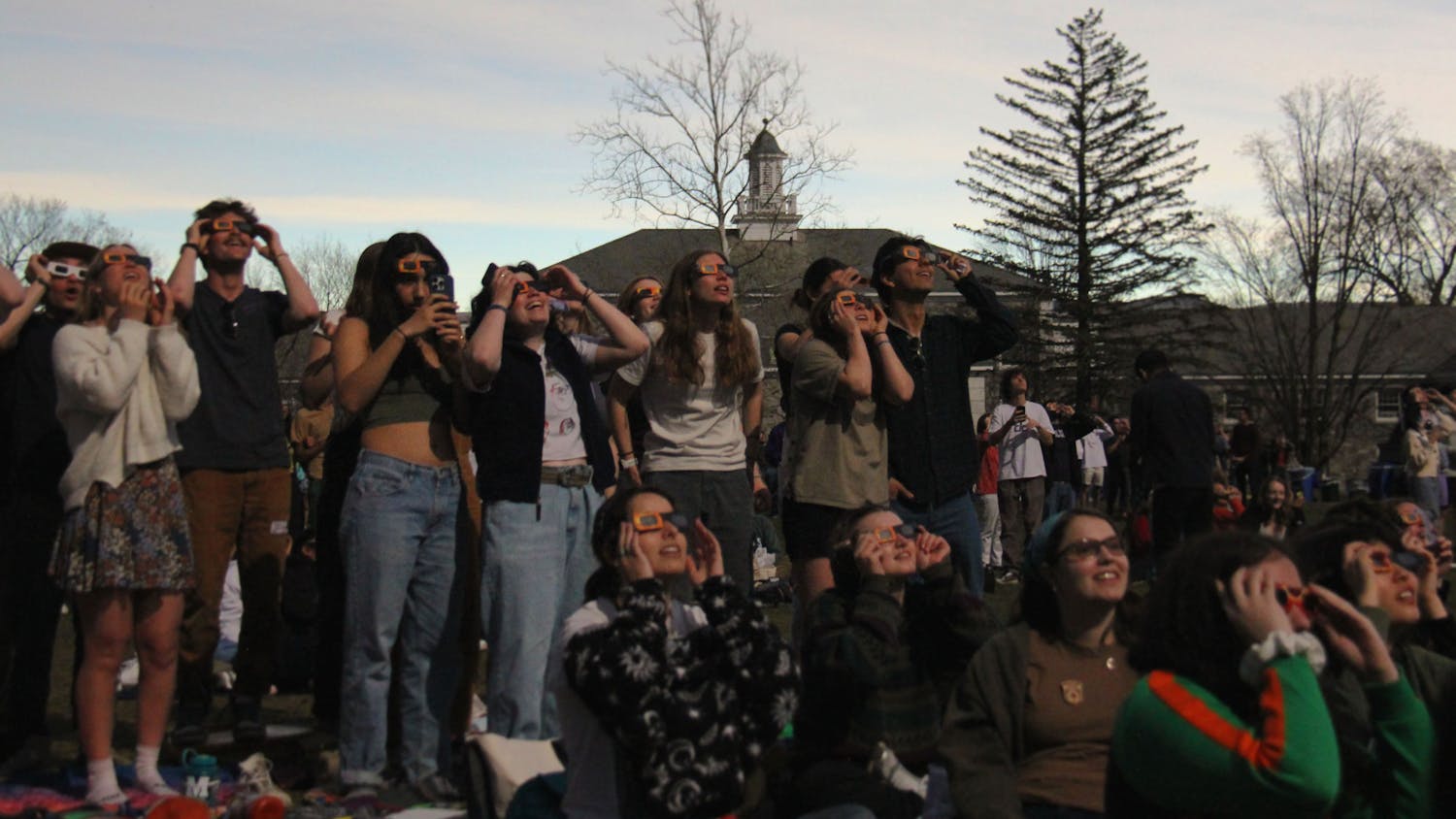On Tuesday, Feb. 25, roughly 100 student athletes from 30 teams met in the McCullough Social Space to discuss homophobia and athletics as a follow-up to Wade Davis’ visit in January.
The discussion, organized and facilitated by James Clifford ’15 and Katie Linder ’15 and co-hosted by Queers and Allies (Q&A), was designed around several questions; primarily, whether homophobia exists within athletics at the College and if so, how it manifests itself. Discussions were further guided to explore the implications of homophobia and homophobic language, as well as possible ways to address these issues in the athletic realm.
“We want to talk about ways to make teams a more welcoming place, if they don’t already feel welcoming to LGBT students,” said Linder, a member of Q&A and the women’s rugby team.
The idea for a discussion among student athletes on homophobia originated within Q&A, stemming from the sentiment that homophobia is particularly present in athletics. The proposition was then directed to Clifford, Director of the SGA Athletics Committee and a member of the men’s alpine ski team, who subsequently paired up with Linder to organize the event solely for members of Varsity and Club Level I teams.
“I’ve experienced some homophobia on teams but also have experienced how great athletics at Middlebury are,” said Linder.
Invitation to the discussion was purposely limited to Varsity and Club Level I athletes (the latter group consisting of members of men’s and women’s rugby, crew, and water polo teams) in order to create and maintain a safe space for meaningful dialogue.
“We didn’t want an ‘us and them’ scenario,” Clifford explained, voicing his and Linder’s worry that bringing in members of Q&A, individuals of the LGBT community, or any other student interested in the topic could lead to an accusatory environment. “We wanted to create a space where there’s a really similar cultural identity, where people feel safe, but where people can discuss this more polarizing and difficult topic within that safer setting and not feel like they’re being judged for being an athlete.”
Clifford and Linder also suggested that initiating a campus-wide dialogue on homophobia was most logistically feasible through sports teams. In addition to the collective nature of sports teams and athletes as student groups, athletics have the infrastructure in the form of coaches and captains to encourage attendance.
“I don’t think we are doing this because we think that athletics has the most rampant homophobia,” Clifford noted. “It’s fair to say that there is homophobia in athletics though I’m not ready to say that there’s more homophobia in athletics than in the campus as a whole. But I think it is at least a worthwhile place to start.”
Director of Athletics, Erin Quinn, concurred with this idea in an email, highlighting the importance of discussions like the one held on Tuesday.
“There are ways that this and any number of issues may have certain elements specific to athletes or teams, but more generally it is great to see the students engaged enough to want to set up the discussions on their own,” said Quinn. “If this sets an example or creates a model for other students to do the same, that would be a great outcome.”
“We’re not trying to change anyone’s minds or preach to anyone,” added Linder. “We’re just trying to get people to start thinking.”
This goal, the student organizers stated, stemmed out of advice from Wade Davis himself during a dinner with the former NFL Cornerback and LGBTQ advocate.
“One of the things he said that I thought was really important was that whenever you’re discussing something that people have really different opinions on … [it’s] more effective to at least have really honest and raw conversation,” Clifford recalled. “That can at least set off some sort of new way of looking at things, which can be really important towards growth.”
Two self-selecting athletes from each team were asked to attend the discussion, though several teams, including women’s lacrosse, had more than two participants.
“I chose to go because I thought it was important that more representatives from the team were there, especially because [homophobia is] not something that we really talk about that often,” said Maddie Kinker ’16 of the women’s lacrosse team. “I think it’s important to figure out how we can start creating this conversation and once we have, what we can learn from that to change and make the community more friendly to every kind of individual out there.”
Clifford and Linder expressed their hope that those individuals who chose to attend the discussion would act as leaders by sharing their experiences and insights from the event with their teammates and so, indirectly “bring [the topic of homophobia] to ‘the front of other teammates’ minds.”
In addition, they conveyed their longer-term goal to carry discussions on homophobia and related issues beyond this single event. In particular, the facilitators hope that attention to homophobia will eventually be incorporated into pre-season athletic meetings, during which athletes currently discuss sexual assault and hazing on teams. Clifford and Linder mentioned support from Quinn on the idea.
Moreover, Linder emphasized the importance of having multiple events that address the topic in different ways in order to continue the dialogue that was kick-started by Davis’ visit.
The discussion is in temporal conjunction with The Office of Communication’s efforts to produce Middlebury’s own You Can Play video, reflecting support of the project for which Davis acts as Executive Director.
“[Davis’] visit generated interest and conversations about the video and added texture and context to the anticipated release … which would have been different without his involvement,” Quinn wrote.
Quinn also cited the importance of the discussion in light of Jason Collins’ recent contract with the Brooklyn Nets and Michael Sam’s coming out before the NFL draft.
“Athletics is behind the curve in these issues nationally, so while they come to the forefront of the national consciousness, it is appropriate and necessary for them to be in the forefront at Middlebury,” Quinn added. “There is certainly a need to discuss these issues solely in the context of their existence at Middlebury College, but the national context can and should inform the discussions as well.”
“It’s a social issue that has come a long way and has a long way to go,” Clifford said. “Like anything, things don’t change overnight … [but] just getting Middlebury students to stop from their work and their sports and their social life and to look at this, that’s an accomplishment itself.”
Teams Discuss Homophobia
Comments



